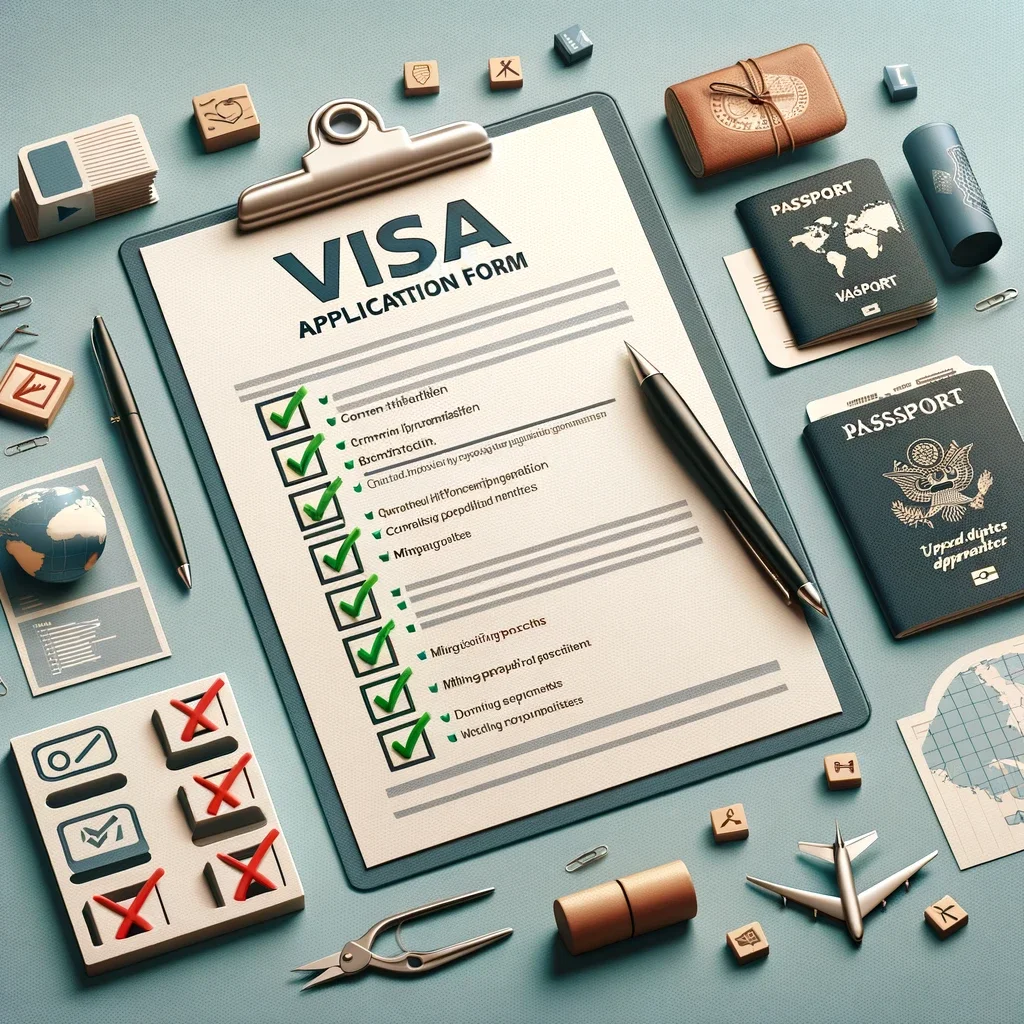10 Common Visa Application Mistakes
#visaapplication, #mistakes, #avoid, #tips
Applying for a visa can be a complex and time-consuming process, and it’s important to avoid making any mistakes that could delay or even disqualify your application. Here are 10 of the most common visa application mistakes to avoid:
- Not applying early enough
- Not having the right documents
- Making a mistake on your application
- Not having enough money
- Having a criminal record
- Having a medical condition
- Being a terrorist
- Being a drug dealer
- Being a human trafficker
- Lying on your application
By avoiding these common mistakes, you can increase your chances of having a successful visa application.
Mistake #1: Not Applying Early Enough
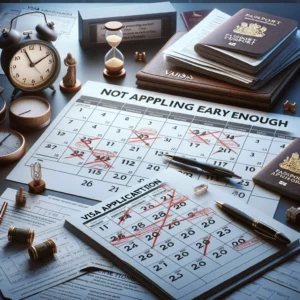
One of the most common mistakes people make when applying for a visa is not applying early enough. The processing time for visas can vary greatly, depending on the type of visa you are applying for and the country you are applying from. For example, the processing time for a tourist visa to the United States can be as short as two weeks, while the processing time for a work visa can be as long as six months.
If you wait until the last minute to apply for a visa, you run the risk of not having enough time to complete the application process and receive your visa before your trip. This could mean that you have to cancel your trip or reschedule it for a later date.
To avoid this mistake, it is important to start the visa application process as early as possible. This will give you plenty of time to gather all of the required documents, complete the application form, and submit it to the embassy or consulate.
You can find out the processing time for your visa by visiting the website of the embassy or consulate where you are applying. You can also contact the embassy or consulate directly to inquire about the processing time.
By applying for your visa early, you can give yourself the best chance of having your visa approved and being able to travel to your destination on time.
Mistake #2: Not Having the Right Documents
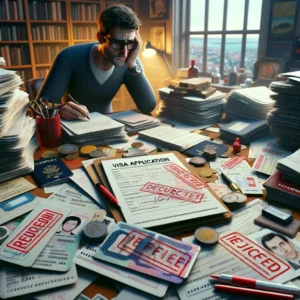
One of the most common mistakes people make when applying for a visa is not having the right documents. This can include not having the correct type of passport, not having enough money to support yourself during your stay, or not having a valid visa for the country you are visiting.
To avoid this mistake, make sure you have all of the documents you need well in advance of your trip. You can find a list of the required documents for your visa on the website of the embassy or consulate of the country you are visiting.
If you are not sure what documents you need, you can contact the embassy or consulate directly. They will be able to help you make sure you have everything you need to apply for a visa.
Here are some of the most common documents you will need to apply for a visa:
A valid passport
A completed visa application form
A recent photograph
Proof of your financial status (such as a bank statement or a letter from your employer)
Proof of your travel plans (such as a hotel reservation or an airline ticket)
A letter of invitation from a friend or family member in the country you are visiting
If you are applying for a work visa, you will also need to provide proof of your employment offer. If you are applying for a student visa, you will need to provide proof of your acceptance to a school in the country you are visiting.
It is important to note that the specific documents you need will vary depending on the type of visa you are applying for. Make sure you check the website of the embassy or consulate of the country you are visiting to see what documents you need.
If you do not have all of the required documents, your visa application will be denied. This can be a very frustrating experience, so it is important to make sure you have everything you need before you start the application process.
Here are some tips for getting the right documents for your visa application:
Start early. The visa application process can take a long time, so it is important to start early. This will give you plenty of time to gather all of the required documents and to submit your application on time.
Check the requirements. Make sure you know what documents you need for your visa application. You can find a list of the required documents on the website of the embassy or consulate of the country you are visiting.
Get your documents early. It is important to get your documents early so that you have plenty of time to make any corrections or changes.
Ask for help. If you are not sure what documents you need, you can contact the embassy or consulate directly. They will be able to help you make sure you have everything you need to apply for a visa.
Mistake #3: Making a Mistake on Your Application
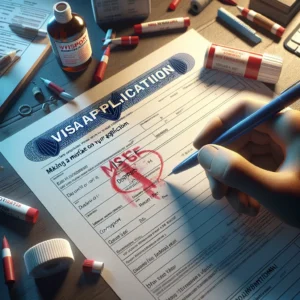
One of the most common mistakes that people make when applying for a visa is making a mistake on their application. This can be anything from a simple typo to a major omission. If you make a mistake on your application, it could delay or even prevent your visa from being approved.
Here are some tips to help you avoid making mistakes on your visa application:
Read the instructions carefully. Make sure you understand all of the requirements for the visa you are applying for. If you have any questions, do not hesitate to contact the consulate or embassy where you are applying.
Double-check your answers. Before you submit your application, take a few minutes to proofread it carefully. Make sure that you have filled out all of the required fields and that your answers are accurate.
Have someone else check your application. Ask a friend, family member, or colleague to read over your application and look for any mistakes. They may be able to catch something that you missed.
If you do make a mistake on your application, do not panic. You can usually correct the mistake by submitting a new application. However, you may have to pay a fee and your application may be delayed.
Here are some common mistakes that people make on visa applications:
Spelling errors. Make sure to proofread your application carefully and correct any spelling errors.
Incorrect information. Make sure that you provide accurate information on your application. This includes your name, address, date of birth, and other personal information.
Incomplete information. Make sure that you fill out all of the required fields on your application. If you do not provide all of the required information, your application may be rejected.
Inaccurate signatures. Make sure that you sign your application in the correct place and that your signature is legible.
By following these tips, you can help to avoid making mistakes on your visa application. This will help to ensure that your application is processed quickly and that you are approved for the visa you need.
Mistake #4: Not Having Enough Money

One of the most common mistakes that people make when applying for a visa is not having enough money. The amount of money that you need to show will vary depending on the type of visa you are applying for, but it is important to make sure that you have enough to cover your expenses while you are in the country.
If you do not have enough money, your visa application will be denied. You may also be denied entry to the country if you do not have enough money to support yourself.
There are a few ways to prove that you have enough money to support yourself while you are in the country. You can provide bank statements showing that you have a sufficient amount of money in your account. You can also provide proof of employment, such as a letter from your employer stating that you will be paid a certain amount of money while you are on leave.
If you are self-employed, you can provide proof of your income, such as tax returns or invoices. You can also provide a letter from your accountant stating that you have enough money to support yourself while you are in the country.
It is important to note that the amount of money that you need to show will vary depending on the type of visa you are applying for. For example, if you are applying for a tourist visa, you will need to show less money than if you are applying for a work visa.
If you are unsure of how much money you need to show, you should contact the embassy or consulate of the country you are applying to for more information.
FAQ
What happens if I don’t have enough money?
If you do not have enough money, your visa application will be denied. You may also be denied entry to the country if you do not have enough money to support yourself.
How can I prove that I have enough money?
You can prove that you have enough money by providing bank statements showing that you have a sufficient amount of money in your account. You can also provide proof of employment, such as a letter from your employer stating that you will be paid a certain amount of money while you are on leave.
What if I am self-employed?
If you are self-employed, you can provide proof of your income, such as tax returns or invoices. You can also provide a letter from your accountant stating that you have enough money to support yourself while you are in the country.
What is the amount of money that I need to show?
The amount of money that you need to show will vary depending on the type of visa you are applying for. For example, if you are applying for a tourist visa, you will need to show less money than if you are applying for a work visa.
If I am unsure of how much money I need to show, who should I contact?
If you are unsure of how much money you need to show, you should contact the embassy or consulate of the country you are applying to for more information.
Mistake #5: Having a Criminal Record
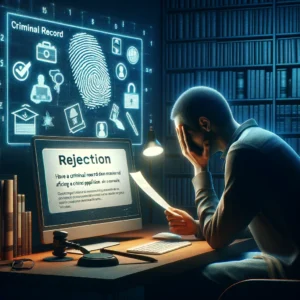
A criminal record can be a major obstacle to getting a visa, especially if you are applying for a visa to a country that has strict immigration laws. Some countries will automatically deny a visa to anyone with a criminal record, while others will consider the nature of the crime and the length of the sentence.
If you have a criminal record, you should be aware of the potential consequences for your visa application. You may need to provide additional documentation to prove that you have been rehabilitated, or you may need to apply for a waiver.
Here are some of the most common types of criminal records that can affect your visa application:
DUI/DWI: A DUI or DWI conviction can make it difficult to get a visa to the United States, Canada, Australia, and many other countries.
Drug convictions: Drug convictions can make it difficult to get a visa to any country, but they are especially problematic for countries that have strict drug laws.
Violent crimes: Violent crimes, such as assault, robbery, and murder, can make it difficult to get a visa to any country.
Sex crimes: Sex crimes, such as rape, child molestation, and sexual assault, can make it difficult to get a visa to any country.
If you have a criminal record, you should consult with an immigration attorney to learn more about the potential consequences for your visa application.
FAQ
Q: What if I have a criminal record, but I have been rehabilitated?
A: If you have a criminal record, but you have been rehabilitated, you may be able to get a visa. You will need to provide evidence of your rehabilitation, such as a letter from your probation officer or a certificate from a drug treatment program.
Q: What if I have a criminal record, but I am applying for a visa to visit a country for tourism?
A: If you have a criminal record, you may still be able to get a visa to visit a country for tourism. However, you may need to provide additional documentation to prove that you are not a threat to the country.
Q: What if I have a criminal record, but I am applying for a visa to work in a country?
A: If you have a criminal record, you may be able to get a visa to work in a country, but it will be more difficult. You will need to provide evidence that you have the skills and qualifications for the job, and you will need to show that you are not a threat to the country.
Q: What if I have a criminal record, but I am applying for a visa to immigrate to a country?
A: If you have a criminal record, it will be much more difficult to get a visa to immigrate to a country. You will need to provide evidence that you have the skills and qualifications to contribute to the country, and you will need to show that you are not a threat to the country.
Mistake #6: Having a Medical Condition

Having a medical condition can be a major obstacle to getting a visa. Some countries may refuse to issue a visa to people with certain medical conditions, while others may require you to provide proof that you are able to pay for your own medical care.
If you have a medical condition, you should be prepared to provide documentation about your condition to the visa officer. This may include medical records, letters from your doctor, or other evidence that you are able to manage your condition.
Some of the medical conditions that may make it difficult to get a visa include:
- Serious illnesses, such as cancer or heart disease
- Mental illness
- Drug addiction or alcoholism
- Infectious diseases, such as HIV/AIDS
If you have a medical condition, it is important to research the visa requirements for the country you are applying to. You may also want to consult with a visa lawyer or immigration specialist to get advice on your specific situation.
Here are some tips for getting a visa if you have a medical condition:
- Provide as much documentation as possible about your condition. This may include medical records, letters from your doctor, or other evidence that you are able to manage your condition.
- Be prepared to answer questions about your condition. The visa officer may want to know how your condition affects your ability to work, travel, and live independently.
- Be honest about your condition. If you lie about your condition, you may be denied a visa or even deported if you are already in the country.
Getting a visa with a medical condition can be challenging, but it is not impossible. By following these tips, you can increase your chances of success.
Mistake #10: Lying on Your Application

Lying on your visa application is a serious mistake. If you are caught lying, you will be denied a visa and you may be banned from entering the United States for a period of time.
Even if you think you are telling a small lie, it is not worth the risk. If you are caught, you will have to answer for your actions.
When you fill out your visa application, be honest and accurate. If you have any questions, do not hesitate to ask a consular officer.
Lying on your visa application is a serious mistake that could have serious consequences. Please be honest and accurate when you fill out your application.

